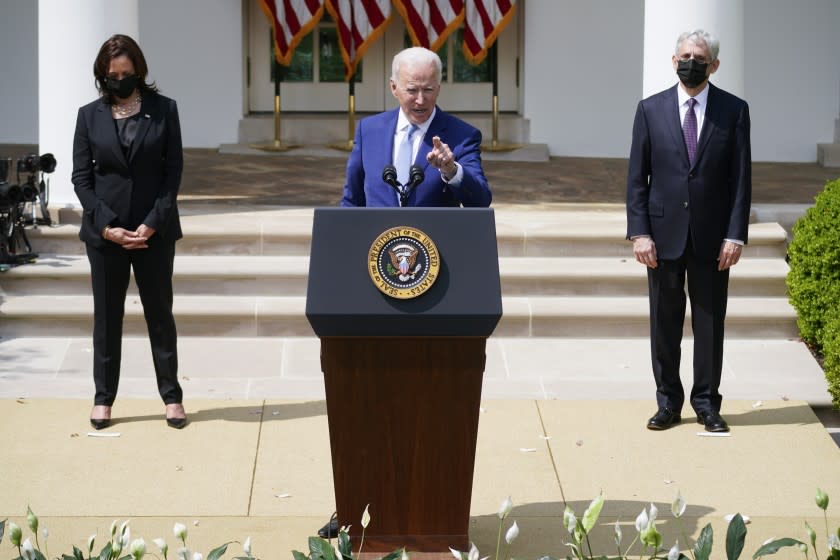Editorial: Biden's moves to curb gun violence should be just the start

- Oops!Something went wrong.Please try again later.
President Biden announced a slate of actions Thursday aimed at fulfilling his campaign promise to combat the proliferation of firearms and gun violence that kills some 40,000 people a year in this country. But the moves, while necessary and welcome, also spotlight how few options a president has for addressing an issue that's critical to public safety and public health.
The fact is, there just isn’t a lot a president can do unilaterally when it comes to gun control, the template for which is dictated by Congress. Lawmakers have given the administration limited regulatory authority over firearms, and Biden directed the Bureau of Alcohol, Tobacco, Firearms and Explosives to develop new rules on sales of gun parts that can, with a little machine work, be assembled into untraceable weapons called ghost guns.
He also ordered up regulations on stabilizers that in effect convert unregulated assault-style handguns into ersatz rifles, like the one used in the Boulder, Colo., massacre two weeks ago. What those regulations ultimately will say is the dangling question, but to be effective, they must at a minimum treat core parts like fully functional firearms, including requiring trackable serial numbers.
The bulk of the president’s agenda, though, is actually a wish list for congressional action. Biden reiterated his support for two bills the House passed in March that would expand mandatory background checks to include nearly every transfer of a firearm, a long-overdue requirement. He also endorsed a far-too-modest proposal that would extend from three days to 10 the amount of time the government has to complete a background check before the sale can proceed by default. That bill would only partially close a dangerous loophole.
Biden also backed legislation that would revive the 1994 ban on assault rifles (it expired in 2004), add people convicted of abusing a boyfriend or girlfriend to the list of those who can be barred from possessing a firearm, and end gun manufacturers' congressionally granted immunity from liability for virtually all damages caused by their weapons. Those are more ambitious and more contentious.
Finally, the president asked Congress to allocate $5 billion over eight years to expand violence intervention programs to try to reduce the number of violent interactions. And he asked Congress for a national “red flag” law, as well as an incentive program for similar laws at the state level, to empower authorities to temporarily keep firearms away from people deemed to be risks to themselves or others.
These are all commonsense approaches to reduce gun deaths, and it’s disturbing that they are such heavy lifts in a Congress so beholden to the myth that an armed nation is a safer nation. But that's the political reality that Americans, and Biden, are confronted with. Let the fight begin.
This story originally appeared in Los Angeles Times.

